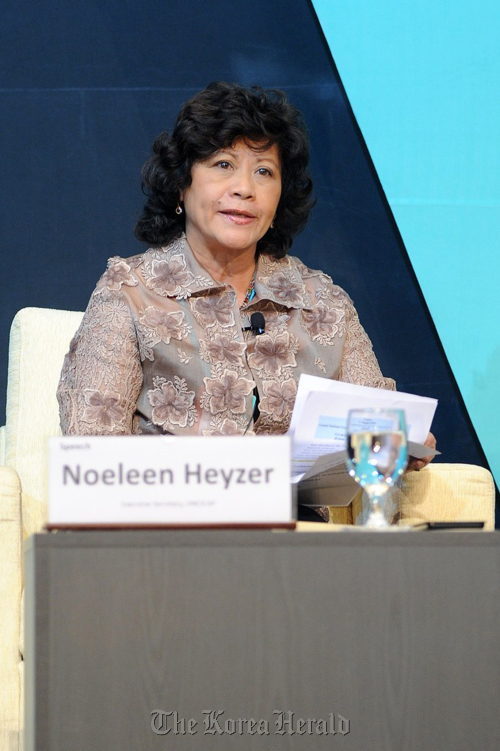The most important shift from the current economic paradigm to a green growth paradigm is a shift of the mindset, Noeleen Heyzer, the executive secretary of United Nations Economic and Social Commission for Asia and the Pacific, said Monday.
“We need to change the way we talk about green growth, which used to be seen simply as a reaction to climate change,” Heyzer said in an interview with Korean media.

Noeleen Heyzer, executive secretary of UNESCAP. (Park Hae-mook/The Korea Herald)
“We need to see green growth as a strategy, new opportunity for growth, a way we generate growth, jobs and use natural resources in a more ecologically efficient manner for sustainability.”
Heyzer was in Seoul on Monday to speak at the Global Green Growth Summit hosted by the National Research Council for Economics, Humanities and Social Sciences, the Global Green Growth Institute and the Organisation for Economic Co-operation and Development. The first GGGS was held under the theme “Building Planet-Responsible Civilization.”
Appointed as the ninth executive secretary of the ESCAP by U.N. Secretary General Ban Ki-moon in 2007, she is the first woman to occupy the position since the commission’s founding in 1947.
One of the main areas the ESCAP is working on is how to invite the business sector to join the deep systematic transformation to a green growth paradigm.
“After the economic crisis, there has been limitation in financing green growth, especially from countries in debt,” Heyzer said.
“We are working on how the private sector can cooperate for green growth in terms of incentives, eco-tech reforms, building sustainable infrastructure, sustainable cities, secure food security and so forth.”
Heyzer emphasized that the Asia Pacific region must shift its focus from quantity to quality of growth, make sure this growth is sustained and shared.
“In Asia, what we call ‘brown growth,’ as opposed to ‘green growth,’ has generated growth but also polluted and created inequality and disparity,” she said.
She mentioned the volatility of energy and food prices as well as short-term capital flows as the major threats to growth in the Asia Pacific region.
“An ESCAP survey said unless we address volatility of energy and food prices, 42 million additional people in the region will fall into poverty,” she said.
“Asia is currently seen as a growth pole, but at the same time, it still houses 950 million of the world’s poorest people. The (U.N.’s) Millennium Development Goals are not going to be achieved without the development of new technologies, innovation, investment in skills and education of people.”
While countries in different stages of development may have their own strategies for green growth, Heyzer was hopeful that China, the biggest economic player in the region, was taking steps to seek green growth.
“China has in fact adopted many of the green growth strategies to improve energy efficiency and develop sustainable cities, for example,” she said.
“The Chinese understand the need to balance economic growth and sustainability, although we obviously need to look at the right mix of energy strategy for nations in different stages of development,“ she added.
The UNESCAP is the regional development arm of the U.N. with membership of 62 governments and a geographical scope that stretches from Turkey in the west to the Pacific island nation of Kiribati in the east.
Established in 1947 with its headquarters in Bangkok, ESCAP has committees on macroeconomic policy, poverty and inclusive development, trade and investment, transport, environment and sustainable development, information and communications technology, disaster risk reduction, statistics as well as social development.
By Kim So-hyun (
sophie@heraldcorp.com)






![[KH Explains] How should Korea adjust its trade defenses against Chinese EVs?](http://res.heraldm.com/phpwas/restmb_idxmake.php?idx=645&simg=/content/image/2024/04/15/20240415050562_0.jpg&u=20240415144419)